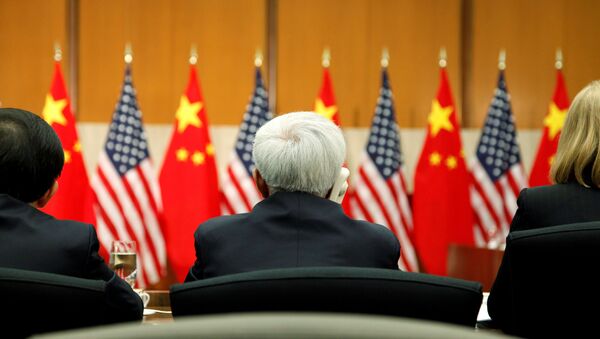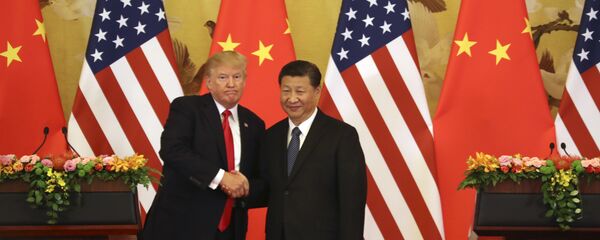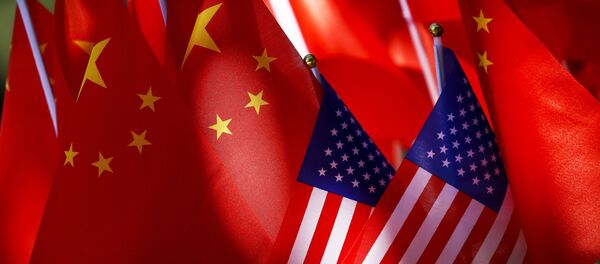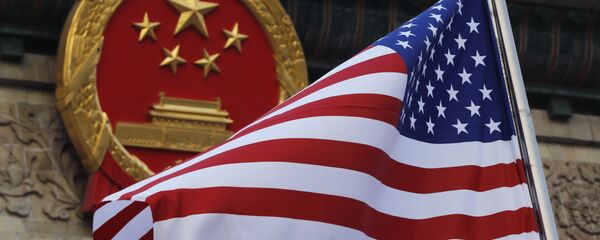Sputnik discussed this with Stuart Orr, a professor at Deakin University's Faculty of Business and Law.
Sputnik: Can the agreement reached by the US and China be qualified as a ceasefire? How sure and lasting could it be?
Stuart Orr: It is quite interesting to watch this drama that's unfolding in front of us. It's very much a game of bluff and counterbluff, I think. At one level we're seeing indications of assent, but at another level there's something going on much deeper, and this is just essentially a sort of a part of a larger play on both parties' sides
Sputnik: How do you think China is really taking this, because when you think about the economic power that China has, I'm surprised at their attitude towards this, because they're a massive, strong player and they've got their own cards to play. Obviously, they don't want to be seen to be ruffling America too much. But it's almost as though Trump seems to be the lead player with all the cards and surely that's not the case. What's your take on this particular game that they are playing? Like you say it's very, very strange for some commentators to understand?
Stuart Orr: It's definitely two levels to this, we're just seeing the give-and-take, the trading much like a chess game where you'll give a minor piece in the order to achieve a bigger strategy.
And really, I guess the bottom line here is there's a race going on here and the objective for both parties is to be the world‘s best and cheapest producer of what we used to call elaborately transformed manufactures, that is, cars and large objects that require a high degree of technology and a really good supply line to be able to produce, and at the moment we have this sort of split between the two countries.
China is a very good supplier, but the US is technologically significantly ahead. So, for China they supply and produce it themselves, the components, but they don't have the capacity to develop technology in the way the US can, and the US has the technology but they don't have the supply of the components. So, both countries are now engaged in a race to be able to cover both sides.
READ MORE: US, China Unlikely to Resolve Key Differences on Trade Within 90 Days — Scholars
So, for China to develop the capacity to be technologically as capable as the US and start producing world cars and those sorts of things, and for the US, it's to find other suppliers, both internally and from other countries to enable it to be relatively independent of China. So, I say that as the final end game for both of these countries.
Sputnik: What's your take on Trump's strategy? I understand it, I get it and a lot of me is saying, yeah, I can totally understand it, but in many ways he's going about it the wrong way in terms of upsetting the food line for all the other countries as well and trying to satisfy other players who are not as key in the supply chain, so it's a highly complex thing, and we just wonder how this is going to end.
But as you say, neither of them can really afford to upset the world too much, because both countries, the US and China, are also reliant on many other countries as both customers and suppliers.
So, if they start to look like they're in trouble or become too unreliable or too inconsistent then foreign direct investment, technology transfer and the whole range of other things that both countries are relying on will start to dry up.
So, they can't make themselves out as being out too unreliable, but on the other hand, as I said, they're trying very hard in the background to fill these problem areas that both the countries are really struggling with, and neither country has found a solution for some time. So, it's certainly coming to a head and it is going to be very interesting to see which way it goes.
Sputnik: How realistic is it to bridge the differences by the next 90 day deadline, is the realistic? And why has China agreed to this existing arrangement? We've alluded to a couple points already. Could we say that Trump's trade tactics seem to be paying off? Do they?
Stuart Orr: Yes, on the surface they do, but underneath there is no change here at all. If you deconstruct it a little bit, there are some relatively minor issues such as IP protection and there's a bit around improving the balance of trade, but this was something that was already rearing its head, so President Xi had to deal with this.
The IP thing, for example, is not really a problem, China is really working aggressively to improve its IP protection anyways, it moves into an innovation base- sort of manufacturing capability, and it has been under pressure from foreign investors to improve it for a long time because they're not bringing the level of technology into China that China would like, because of that. So, that's not really an issue, they'll be comfortable to agreeing to that, there's a lot of work in that area already.
As I said, the balance of trade issue is very much an issue of faith for Trump, that's what his campaign was based on, and it's really something that President Xi knew that they had to make some concessions to it.
There's another agreement to purchase energy, I think, as well. China is a net energy importer, so, again, this is not really an issue. So, I think in terms of intermediate stage it is probably not as challenging as it may seem, and that's a good way, as I said, just keep things at the level they are at now to enable China to continue to work on its technology capability.
Neither country can really afford the 25% tariffs. If the US puts that tariff on the Chinese components then the US manufacturers will not be able to afford to use those in their products, it will make them too expensive, and then they'll have a massive problem.
And China will find that it if the US demand rises they're going to have a massive overcapacity, and that's going to be a real problem for the economic conditions in China and the rather tight balance that they've currently got between economic performance and growth, which China is trying to achieve at the moment.
The views and opinions expressed by the contributors do not necessarily reflect those of Sputnik.




